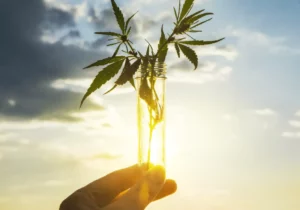Hemp cultivation in the United States is as old as the country itself. As the story goes, even George Washington grew hemp.
Our first president certainly saw the virtues of the versatile plant, used for:
- Paper
- Fiber
- Medicine
- Food
He’d no doubt approve of the signing of the Farm Bill in 2018, which legalized industrial hemp.
The potential for hemp to radically improve the lives and incomes of America’s farmers is astounding. Large-scale hemp cultivation gives the U.S. a competitive edge against China, the country that cultivates 50% of the world’s hemp.
Hemp brings in a much higher per-acre price to the famer than corn does. And unlike corn, hemp takes a fraction of the water to grow.
Over the next few years, hemp farms will begin to blanket the American landscape. A state-by-state-guide of the current laws regulating the growing and manufacturing of hemp shows that even though industrial hemp is legal at the federal level, it will be up to individual states to define how hemp will be licensed, manufactured and distributed.
RELATED: HEMP’S HISTORY AS A SOURCE OF FOOD, FIBER AND NOW CBD
Because the bill passed only a few months ago, farmers are having some challenges buying hemp seeds for planting. Many states are creating pilot programs to help lawmakers grapple with the new challenges of creating rules for hemp. It’s a plant that was, until now, erroneously lumped together with its cousin the cannabis plant, which contains tetrahydrocannabinol (THC), the cannabinoid responsible for the well-known euphoric high.
Despite the fact that industrial hemp contains an almost untraceable amount of THC, it was federally regulated as if it were a dangerous drug on par with heroin. With the passage of the Farm Bill, everything has changed.
Now That the Farm Bill Passed, Is CBD Legal?
Cannabidiol (CBD) is one of the many chemical compounds found in the hemp plant. Hemp-derived CBD oil forms the basis for the products currently sold in many parts of the United States to help address a variety of medical issues including inflammatory conditions, anxiety and insomnia.
Prior to its use as a therapeutic support for medical conditions, hemp was mostly used for industrial purposes such as fiber and cloth. With the explosion of CBD products being manufactured for the health and wellness markets, lawmakers are working overtime to determine the best way to regulate all aspects of the CBD industry.
One of the Farm Bill’s most exciting changes to the regulation of hemp and hemp-derived CBD products is moving its regulation from the Controlled Substances Act to the Department of Agriculture. For the first time in nearly 80 years, hemp is no longer a controlled substance.
Challenges still remain regarding how the Drug Enforcement Administration will ultimately classify CBD. Currently, the DEA has lowered drugs approved by the Food and Drug Administration containing CBD from Schedule I, where THC-containing cannabis remains, to a much-lower Schedule V. Right now, there’s only one drug that falls into this FDA-approved category: Epidiolex, which contains CBD and is used to treat a form of epilepsy.
There’s still a great deal of uncertainty regarding how or if the DEA will regulate the thousands of therapeutic CBD products available to the public. CBD activists point to the fact that to date, the FDA “has not prohibited the sale of hemp-derived CBD products or ordered a product recall.” Activists are heartened by recent comments from FDA Commissioner Scott Gottlieb, who stated that there could be a path by which cannabis-derived compounds would be permitted in a food or dietary supplement.
Hemp & CBD Producers Are Optimistic About the Future
Despite some of the early confusion regarding CBD’s legal status, those in the industry couldn’t be happier. The Farm Bill protects hemp farmers and hemp-derived product manufacturers from prosecution. For the first time, U.S.-based CBD manufacturers will have the opportunity to purchase large quantities of CBD oil from American farmers.
RELATED: ONE FARMER’S TRANSITION FROM CATTLE TO CANNABIS
The growing industry has enormous possibility to support small farmers. Farmers who choose to grow hemp organically will now be able to get their hemp organically certified, because of its new status as a legal, federally recognized crop.
Hemp product manufacturers are already looking into the possibilities of the inclusion of CBD and other hemp derivatives into other products, as consumers continue to show their interest in consuming CBD in foods and beverages, as well as using it topically and in other preparations.
The Farm Bill Will Help Researchers Hone in on the Scientific Basis for CBD’s Efficacy
Now, with the legalization of hemp, the opportunities for research on CBD will grow. Research will result in bringing better, safer and more standardized products to the consumer, while pinpointing the exact ways CBD works on the body and mind.
Research has already confirmed that hemp-derived CBD has been shown to be a safe additive in foods and supplements. Even the World Health Organization’s findings determined that CBD doesn’t lead to abuse or dependency, and that it appears to be well-tolerated by the majority of the public.
Another tremendous benefit of the Farm Bill will be the research that can now take place on some of the other cannabinoids in hemp. These are already showing promise for the delivery of other beneficial properties for health.
Can I Get Arrested for Possessing a CBD Product?
Is it possible that an asteroid will fall on your house? Sure. Is it possible that you’ll be arrested for possessing a product containing CBD? It’s legally possible, but the likelihood of law enforcement busting the public for possession of CBD is probably equivalent to that asteroid falling on your home.
However, it’s important to remember that the CBD products you currently own were grown and purchased prior to the passage of the Farm Bill. So technically, they’re still considered federally illegal to possess.
Is law enforcement interested in arresting someone for possessing what’s akin to a dietary supplement? Probably not, but it’s important to keep your CBD products as you would a prescription medication or beauty product—away from the kids and not stored on the dashboard of your vehicle.
CBD Has a Bright Future, but it Will Take Vocal Consumers to Help Take it to the Next Level
As we’ve seen with states that have legalized adult-use marijuana, the regulations for clean, lab-tested products is one thing that everyone agrees has greatly benefitted the cannabis industry and consumers.
And though some CBD producers have already received warning letters from the government regarding their business practices, most industry analysts feel that with the support of enthusiastic and vocal consumers, CBD will find a legal place on the shelves of grocers, health food stores and pharmacies.
Advocates hope that with consumer pressure, the FDA will be compelled to regulate CBD similarly to over-the-counter medications or health supplements. Though it will take time for states and local jurisdictions to weigh in on the growing, manufacturing and sale of hemp-derived products like CBD, the industry, which is slated to top $1.6 billion in sales in the next few years, is poised to bring a plethora of new products to store and virtual shelves in the very near future.
Photo credit: Felix Broennimann/Shutterstock.com
Want to try CBD, but don’t know where to start? Shop our selection of high-quality, lab-tested CBD products and have them shipped to your door. And if you have questions about CBD, ask them and our community will answer.






